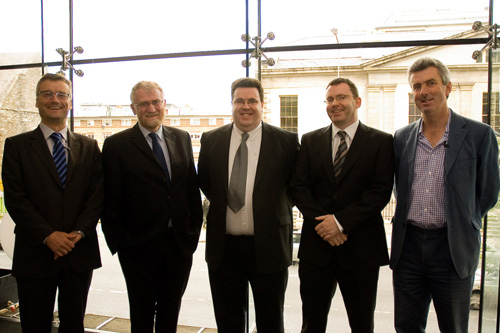‘Energy Efficient & Low Carbon Manufacturing’ theme of International Manufacturing Conference at TCD
Posted on: 03 September 2009
‘Energy Efficient and Low Carbon Manufacturing’ was the theme of the 26th International Manufacturing Conference (IM26), featuring leading academics and members of industry, hosted by the TCD School of Engineering’s Department of Mechanical & Manufacturing Engineering this week (September 2-4th). The conference began with an industry focused day which was opened by Trinity’s Vice-Provost / Chief Academic Officer, Professor Patrick Prendergast, who spoke on ‘Innovation in the university: it is time’. In his opening speech, Professor Prendergast referred to the TCD / UCD Innovation Alliance and emphasised that universities play a crucial role in creating a scientific and cultural environment for innovation. Adding that: “In our education we at undergraduate as well as graduate level continue to place a high value on critical thinking and innovation”. In terms of the necessary infrastructure for such development, the Vice-Provost / Chief Academic Officer emphasised that: “The network necessary for creative innovation is best met by a set of autonomous institutions collaborating according to their roles and expertise; these roles emerge in response to societal needs in a flexible and adaptive way”.

Prof Patrick Prendergast, Vice-Provost/Chief Academic Officer, TCD, Prof Gerry Byrne, President CIRP, Mr Kevin Kelly, TCD, Dr Garret O’Donnell, TCD, Dr Julian Allwood, University of Cambridge.
Keynote speakers on the industry focused day included:
Professor Gerry Byrne, President of International Academy of Production Engineering (CIRP) and Professor of Mechanical Engineering at University College Dublin spoke on ‘Future directions for manufacturing engineering – An environmental and energy perspective’. Professor Byrne gave an international perspective on energy and environmental issues facing industry worldwide.
Dr Julian Allwood, Director of the Low Carbon Materials Processing Group, University of Cambridge, spoke on ‘Low carbon manufacturing’. Dr Allwood’s talk stimulated debate on the topic of carbon emission resulting from manufacturing industry. He challenged current thinking on the progress of technology and that of the industrialisation of emerging countries.
.
Dr Paul Dunne of OpenHydro gave a talk on ‘Energy from the ocean – novel tidal energy solutions’. OpenHydro is a technology business that designs and manufactures marine turbines to generate renewable energy from tidal streams.
Colin O’Brien, Operations Manager – Diageo, spoke on ‘Guinness Brewery: 250 years of manufacturing improvement’.
Dónal Óg Cusack, Energy Group – DePuy Johnson & Johnson, gave a talk on ‘Industry energy challenges in bio-medical manufacturing’. Mr Cusack’s talk demonstrated the approach by this leading multinational in the medical sector in addressing the challenge of operating in a country where energy costs were relatively high. He reflected on strategies and approaches used to manage this issue including the development of the newly forming competence centre I2E2.
Barry Kennedy (Intel Ireland, I2E2/ICMR) spoke on ‘Innovation in Ireland’s energy efficiency’. He provided a perspective on energy related issues in the manufacture of semiconductor devices, and stimulated the delegates to critically examine current thinking on energy usage. Mr Kennedy also outlined the newly emerging competence centre on energy efficiency and how this would support Irish based industry.
Commenting on the significance of the gathering, the conference chairman, Kevin Kelly stated: “Ireland has the potential to secure and grow our manufacturing industry through research in energy efficiency. We are delighted to welcome leading experts from academia and industry to share their perspectives on the highly topical and relevant theme of energy efficient manufacturing. The current economic crisis has put huge pressure on individuals and corporations to reduce their costs and look for greater efficiencies in the conduct of their business. This crisis also provides us with an opportunity to position Ireland as a leading innovator in the development of new and improved processes and strategies which have energy as a core driver.”
The conference audience was made up of academia and industry and companies in attendance included Xerox, Hewlett Packard, Intel, DePuy Johnson & Johnson. The industry focused session was followed by workshops which provided an opportunity for industry and academic practitioners to have a hands-on collaborative knowledge-exchange experience in areas of strategic relevance to the Irish manufacturing sector.
